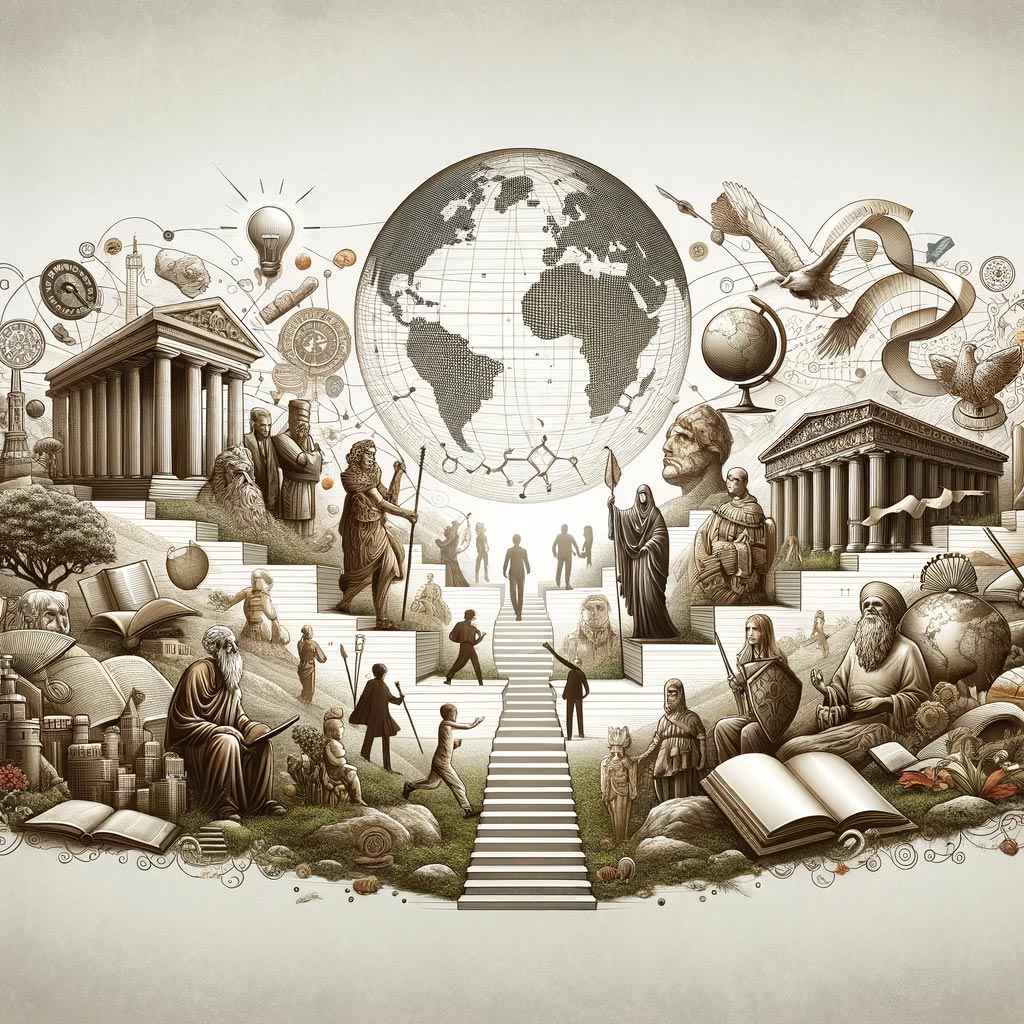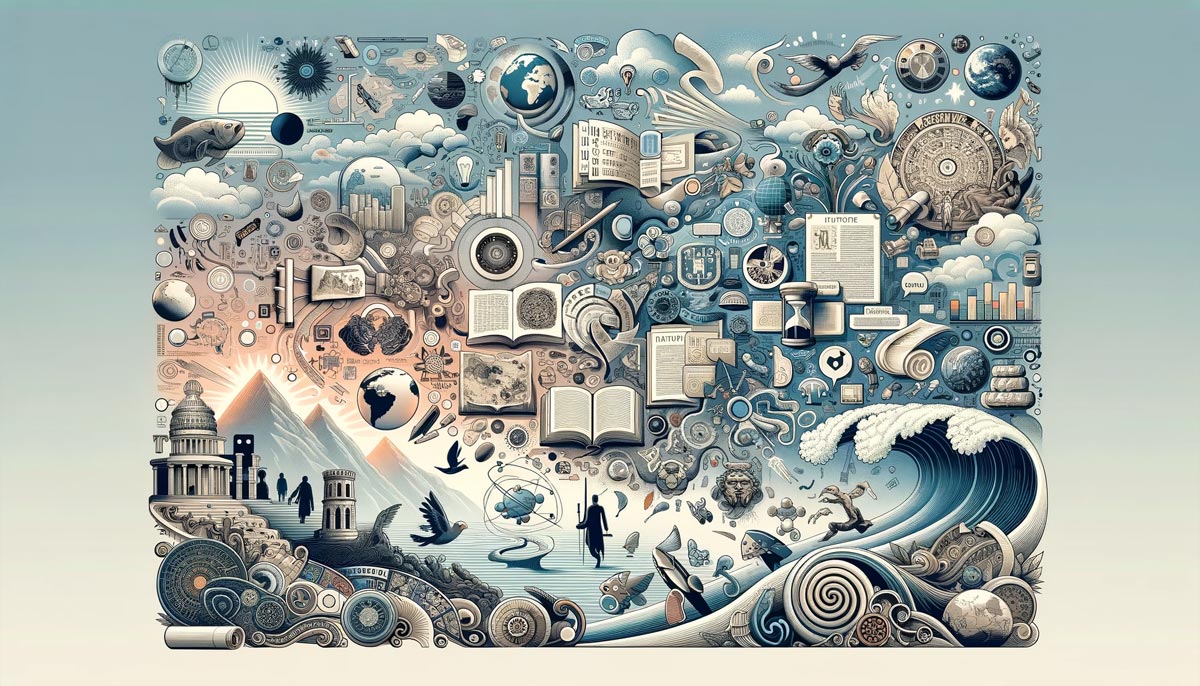
When you hear "history," you might think of dates, wars, and names etched into textbooks. But history is far more than a collection of events. It's the story of humanity—how we've evolved, struggled, and succeeded over centuries. In a world that often prioritizes looking forward, understanding history gives us the context to navigate the present and shape the future.
This article explores why studying history matters and how it impacts individuals and societies. You'll learn how history fosters critical thinking, empathy, a more profound knowledge of our cultural roots, and practical ways to engage with history daily.
Defining History and Its Study
What Is History?
History systematically studies past events, particularly those that shaped human societies. It's not just about memorizing timelines—it's about interpreting the causes and effects of those events.
For example, the Industrial Revolution wasn't just about machines; it transformed economies, created social challenges, and influenced modern labor laws.
How Historians Study the Past
Historians construct narratives using primary sources like letters, diaries, and official records. They also use archaeology and technology tools, such as carbon dating, to uncover details about ancient civilizations.
For example, the discovery of the Dead Sea Scrolls provided a deeper understanding of religious and cultural practices in ancient times.

Why Studying History Is Important
1. Understanding Cultural and National Identity
History helps us understand who we are and where we come from. It connects us to our cultural roots and national identity. For example, studying the unification of Germany under Otto von Bismarck explains the country's modern political structure and unity.
Similarly, understanding the history of Nepal's unification under Prithvi Narayan Shah fosters a sense of national pride and identity.
2. Learning from Past Mistakes and Successes
As philosopher George Santayana famously said, "Those who cannot remember the past are condemned to repeat it." Historical events like the World Wars teach us the dangers of unchecked power, while successes like the Marshall Plan demonstrate how collaboration can rebuild nations.
A 2018 survey by Pew Research found that 76% of respondents believed historical knowledge was crucial for making informed decisions about current events.
The post-WWI Treaty of Versailles is often cited as a factor leading to WWII, underscoring how punitive measures can have unintended consequences.
3. Enhancing Critical Thinking
History encourages you to analyze events from multiple perspectives, fostering critical thinking. For example, examining the causes of the American Civil War involves understanding economic, cultural, and political factors—not just one narrative.
4. Informing Public Policy
Policymakers often look to history for guidance. For example, studying the Great Depression led to the creation of modern economic safeguards like unemployment insurance and banking regulations.
According to a report from the University of Cambridge, policymakers who studied historical trends made decisions with more significant long-term benefits.
5. Fostering Empathy and Global Awareness
By learning about diverse cultures and experiences, history helps you develop empathy. For example, studying the transatlantic slave trade reveals the long-lasting impact of systemic racism, encouraging a commitment to equality and justice.
Practical Applications of Historical Knowledge

Practical applications of history extend far beyond the classroom, influencing creativity, decision-making, and justice in tangible ways. By understanding the past, we empower ourselves to innovate and lead more effectively in the present and future.
1. Education and Curriculum
History isn't just about the past; it's a foundation for understanding how societies evolve and interact. It provides essential skills that extend beyond the classroom. History students learn to evaluate sources critically, identify biases, and construct evidence-based arguments—skills transferable to many other subjects and professions.
Moreover, history encourages curiosity and intellectual growth, fostering a sense of inquiry that benefits sociology, political science, and anthropology. Schools that emphasize historical education often report higher levels of student engagement, as history connects theoretical knowledge with real-world applications.
For example, students studying the causes of the American Civil War can see parallels in modern-day debates over state and federal authority, providing a deeper understanding of ongoing political challenges.
2. Literature, Art, and Media
Historical events are a wellspring of inspiration for creative expression, often serving as the backdrop or central theme of literature, visual art, and media.
The novel All Quiet on the Western Front depicts the horrors of war and challenges readers to question the human cost of conflict. Similarly, Picasso's "Guernica" immortalizes the tragedy of the Spanish Civil War, serving as a powerful anti-war statement that resonates across generations.
Historical documentaries and period dramas, such as Schindler's List or The Crown, illustrate how history shapes storytelling. They help audiences connect emotionally with events they might otherwise view as distant or abstract. These creative works make history more accessible, ensuring its lessons are preserved and shared engagingly.
3. Business and Economics
In the corporate world, history serves as a strategic tool. Companies use historical data to analyze market patterns, assess risk, and innovate solutions based on past experiences.
For example, the 2008 financial crisis provided valuable lessons on regulatory oversight, risk management, and the importance of transparency in banking. Businesses that understand historical economic trends are better equipped to adapt to changing markets by predicting inflation cycles or learning from previous enterprises' failures.
Moreover, understanding trade history, such as the Silk Road or the Industrial Revolution, allows companies to innovate in logistics, supply chains, and global outreach.
4. Legal Systems and Justice
The legal field relies heavily on historical precedents to guide contemporary rulings and interpretations. Influential cases such as Brown v. Board of Education and Roe v. Wade demonstrate how the legal system adapts to address societal changes and evolving values. These cases, grounded in historical contexts, continue to shape discussions about equality, privacy, and human rights.
Additionally, studying historical injustices, such as apartheid or the Holocaust, has led to international frameworks like the Universal Declaration of Human Rights, ensuring accountability and justice on a global scale.
Lawyers and policymakers regularly draw upon historical examples to build more equitable systems, reinforcing the importance of history in shaping laws and governance structures that serve all citizens fairly.
Challenges in Studying History
By acknowledging and addressing the challenges of studying history, we can strive for a more inclusive, accurate, and well-preserved historical record, enabling a deeper and more balanced understanding of the human experience.
1. Bias in Historical Narratives
Those in power often shape history, so our inherited narratives can be incomplete or skewed. For example, colonial histories frequently glorify the achievements of imperial powers while downplaying or omitting the experiences of indigenous peoples. These biases can perpetuate stereotypes and hinder a comprehensive understanding of the past.
A study by the Journal of Historical Narratives revealed that 68% of history textbooks in former colonies underrepresented native perspectives, emphasizing the importance of reevaluating historical sources critically. Addressing these biases requires examining multiple viewpoints and incorporating diverse voices into the historical narrative.
For example, recent efforts to include oral histories from marginalized communities have provided richer, more accurate accounts of historical events.
2. Historical Revisionism
Revisionism—the process of reevaluating historical events or figures—is often controversial but essential for progress. As new evidence emerges or societal values shift, our understanding of history must adapt.
For example, modern historians have reexamined the role of women in ancient societies, revealing their significant contributions to areas like governance, education, and trade, which were previously overlooked or minimized.
Similarly, reinterpretations of the Reconstruction Era in U.S. history have challenged outdated narratives, offering a more nuanced view of its successes and failures. While some argue that revisionism undermines established history, it ultimately strengthens our grasp of the past by encouraging critical thinking and open dialogue about historical complexities.
3. Preservation of Records
Preserving historical records is a constant challenge. While digital archives, such as those maintained by the British Museum or UNESCO's Memory of the World program, have made countless documents and artifacts accessible globally, many historical records remain at risk.
Environmental factors like humidity, natural disasters, and poor storage conditions threaten the survival of physical artifacts. For example, the loss of the Library of Alexandria is a stark reminder of how easily invaluable knowledge can disappear.
Furthermore, political instability and conflict often destroy cultural heritage, as seen with the looting of the National Museum of Iraq during the 2003 invasion. Addressing these challenges requires international cooperation and investment in preservation technologies, such as 3D scanning and digital archiving, to ensure future generations can learn from the past.
How to Engage with History in Everyday Life
Visit Museums and Historical Sites
Museums offer hands-on ways to connect with history. Visiting a place like the Anne Frank House provides a personal perspective on historical events.
1. Read Biographies and Historical Literature
Works such as Anne Frank's Diary of a Young Girl or Doris Kearns Goodwin's Team of Rivals provide profound perspectives on significant historical figures and events, shedding light on their lives and the contexts they navigated.
2. Participate in Cultural Events
Cultural festivals and reenactments bring history to life. For example, attending a traditional Dashain celebration in Nepal can connect you to its historical significance.
3. Explore Digital Resources
Online platforms like JSTOR and the Smithsonian's digital archives make historical documents accessible.
Conclusion
History isn't just about the past—it's a lens through which we understand the present and prepare for the future. Studying history gives you critical thinking, empathy, and decision-making skills. Whether you visit museums, read biographies, or analyze historical events, engaging with history enriches your understanding of the world.
History isn't just a subject—it's a guide. Start exploring today and see how it transforms your perspective.
Frequently Asked Questions (FAQ)
Why is history important in education?
History teaches critical thinking and cultural awareness, preparing students for global citizenship.
How does history contribute to personal development?
By fostering empathy and analytical skills, history helps individuals understand their societal role.
What careers benefit from studying history?
Careers in law, public policy, education, and business rely heavily on historical knowledge.
Where can I find reliable historical resources?
Reputable sources include JSTOR, Project Gutenberg, and university archives.
How can I critically assess historical information?
Cross-reference multiple sources and evaluate the context and perspective of the narratives.
History




